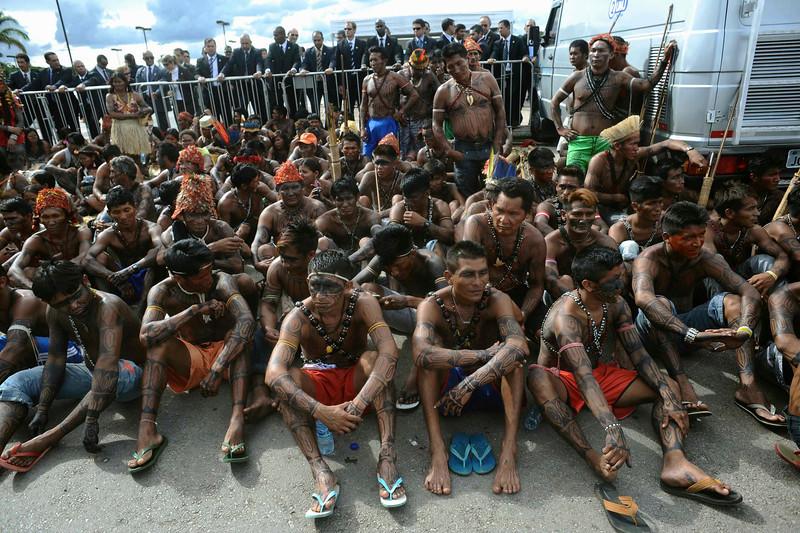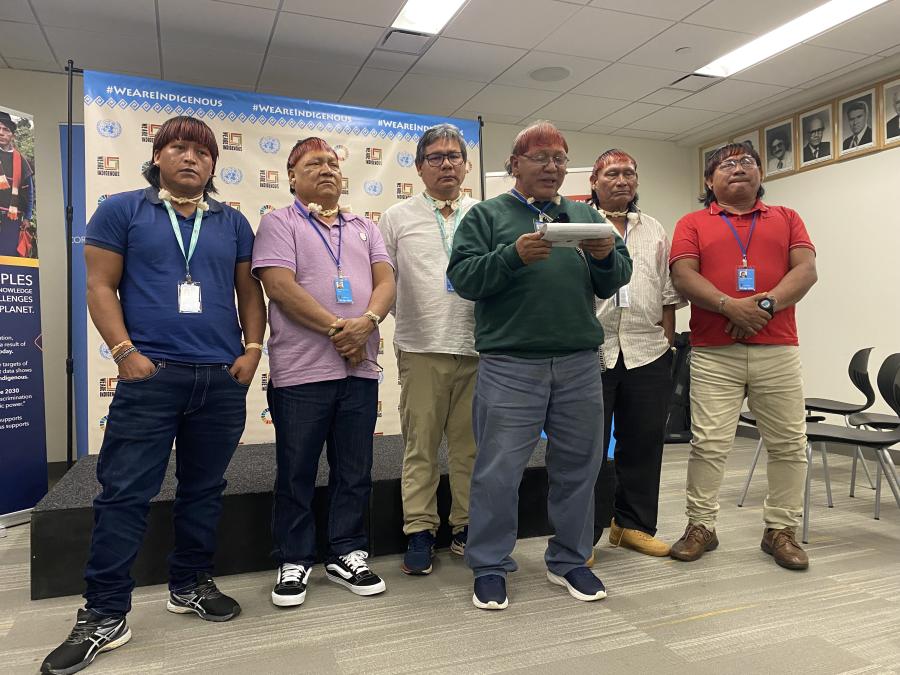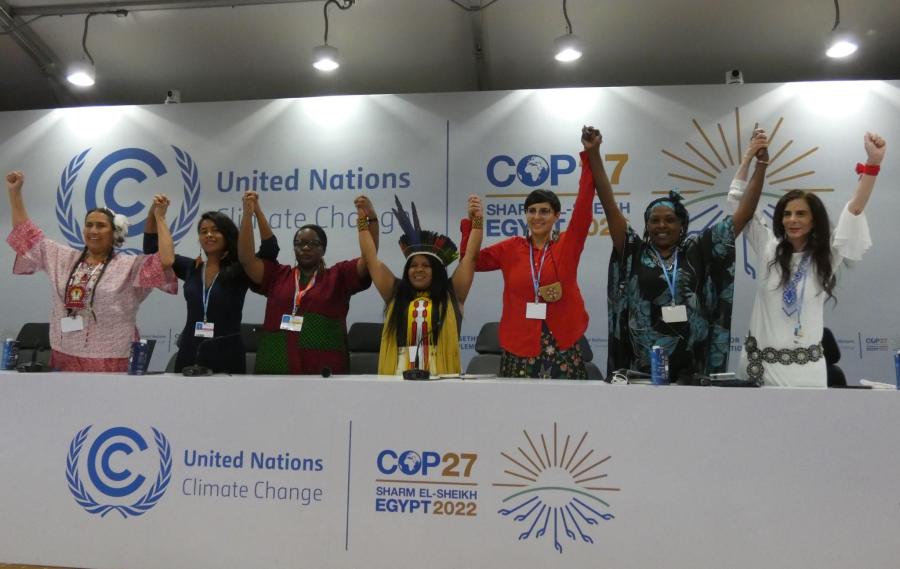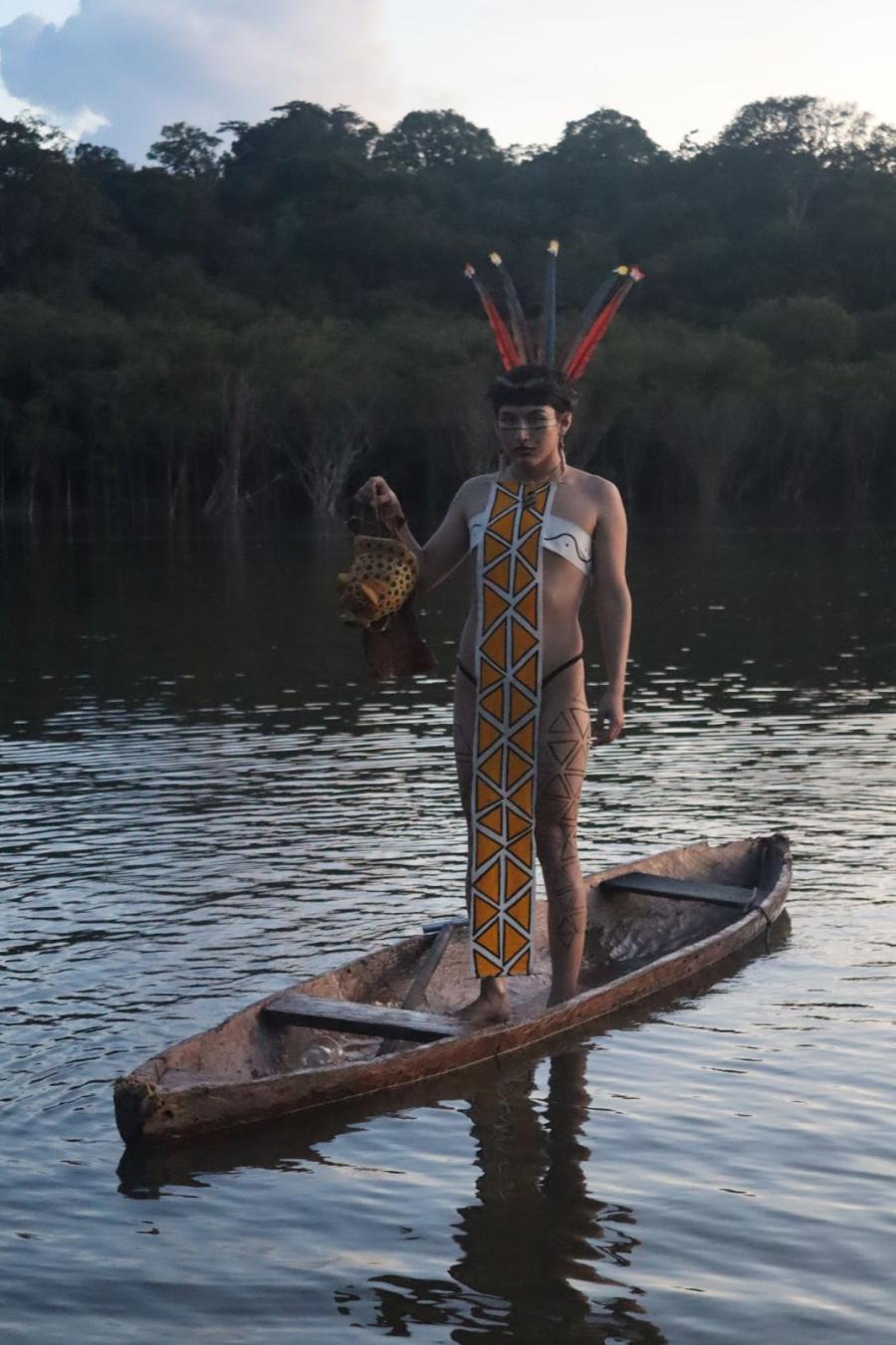
On June 4, 2013, 144 Munduruku Indians boarded Brazilian Air Force Planes in Altamira en route to Brasilia to attend talks with the government to address a week-long occupation of the contentious Belo Monte dam on the Xingu River. Amazonian Indians from the Munduruku along with those from the Juruna, Kayapo, Xipaya, Kuruaya, Asurini, Parakana, and Arara tribes have bonded together to occupy the main construction site of the Belo Monte hydroelectric dam—a dam costing $14 billion and projected to be the third largest dam in the world. Flooding from the dam raises environmental concerns ranging from ecosystem destruction to deforestation. These concerns accompany the Brazilian government’s estimate of the displacement of some 16,000 people, a number that some nongovernmental organizations have estimated closer to 40,000—many of which would be Indigenous Peoples.
Upon arriving at the Planalto Palace in Brasilia, the Munduruku Indians passed through metal detectors on their way to meet with the secretary general of the presidency, Gilberto Carvalho. These talks were meant to address the Belo Monte dam occupation and further diffuse tensions between Dilma Rousseff’s government and Indigenous groups rising due to the government’s plans to build more hydroelectric dams in the Amazon. The Munduruku who live largely along the Tapajos River want the government to shelve dam projects along the Tapajos, Xingu, and Teles Pires Rivers.
The Munduruku leadership released a letter on June 8, 2013, translated by anthropologist Glenn H. Shepard, outlining some of their history, mythology, relationships to sacred territories, and inextricable connection to the world around them. They begin, “The Munduruku are the most numerous indigenous people of the southern part of Pará state, currently they are 12,000 individuals.” They speak of their shamans’ knowledge and the balance kept between man and nature:
“We know how the law of nature works through the teachings of the ancients and how we should respect nature. And animals also contribute because they teach us things that we don't know, and we can interpret the messages they transmit to us: this is very important. For this reason we respect them and they also respect us, this is how we live in harmony with nature. The animals teach us, they warn us of dangers that are about to happen, whether good things or bad. Non-Indians say these are just superstitions but for is it is real. Those who disrespect nature, they will have to suffer the due consequences of their actions. You should not play with nature: for us, this is very dangerous, and that is why we respect it. All animals have caretakers, thus, they have mother-spirits, whether fish, or forest animals, birds, plants, fire, earth, wind, waters, even spirit beings, they all have lives. They need to be respected and they are sacred. We have sacred places along our Tapajós river and we, the Munduruku, do not disturb these places.”
The Munduruku leaders continue:
“All Munduruku possess knowledge that they guard within themselves. This knowledge was passed along orally by the ancestors in order that cultural values and ancient knowledge not disappear. All old people are bestowed with knowledge, and for the young to acquire this knowledge they must rigorously obey Munduruku rules: nothing is impossible when you want to achieve perfection. We know when people lie, when they want to deceive us, when people are cunning, ambitious and greedy. We know about their underlying motivations, their economic interests: they have no love for life. Because we have love for people, we know how to respect others, how to share, for us there is no such thing as poverty, we are all equal, we know how to divide with those who have not. There are no rich or poor within our indigenous society, we do not favor some over others and much less discriminate. In our world such things do not exist, just love, respect, peace, humility, sincerity. We live happy without money, without mansions to live in, without material goods. Life is more important, money doesn't bring us happiness, only disgrace. When we have money, we forget about our relatives, we become egotistical, we don't care about anyone else. Thus begins the disrespect for other people, we become individualists. When we say we don't depend on anyone else, it is pure folly. Money is a curse, it makes us forget to look at ourselves and at others. People don't have time for their families, they only care about their job, their pastimes. They get stressed, they get worried, they don't sleep well, then can't maintain a dialog with their family. It is because they forget about those closest to them, those dear to them, they only care about their business. When we stop to think, we begin to look inside ourselves and this makes us open our eyes and begin to see what's right in front of us, and this brings peace to our spirit, this is very satisfying. We, the Munduruku, this is how we are: we value that which is around us.”
Questions have arisen as to the extent of cooperation and dialogue the Brazilian government has been willing to engage in with the local inhabitants who will be affected by their large development projects. Although under the Brazilian constitution the government must hold public hearings with people affected by its projects, many Indigenous groups are incensed over the government’s treatment of their opposition. Rousseff and her government have also received criticism from international environmental and activist organizations decrying blatant violations to environmental and Indigenous rights. The Munduruku leaders conclude their statement with an address:
“Dear sirs,
Given the facts related above about our situation, we hereby state that we are outraged by the way the Brazilian government has been treating us. We see the disrespect done to our peoples, the Constitution being torn to shreds, becoming invalid, in order for our rights not to be guaranteed by it. Now, our own territory has become a battleground, where we are being exterminated, assassinated at gunpoint by the government's armed forces. We no longer have the right to scream out and be heard and no one comes to our assistance when we ask for help. The military police should provide us with security and protection. We see that this is not happening, on the contrary. The government is using violence and sending researchers against our will to carry out studies and justify their projects on indigenous lands. We were never consulted and no one told us about the government projects in our areas. And when the government finally talks about dialog, they are already building dams on our rivers. When we protest against the government decisions, they say they don't accept our decisions, all that matters are their decisions. This is what Minister Gilberto Carvalho said in the meeting on Tuesday, June 4: "Whether you like it or not, the hydroelectric dams at São Luiz do Tapajós, Belo Monte and Teles Pires are going to be built." And so, what purpose does it serve to now consult with us if our decision won't be taken into consideration? Where are our rights, our right to be respected?
Even the laws that protect the environment don't exist any more, the environmental licenses are being given out in full knowledge that the construction projects will impact and destroy nature, even impact the lives of the people who will be affected, and this is not taken into consideration, the risks they will suffer, the life that will never again be the same for them. The life of the forest animals, in danger of extinction, as much as the fish and all biodiversity of life. The Munduruku population and other inhabitants who depend on natural resources, whose subsistence comes from the river and the forest: we want our rights to be guaranteed, the respect for our lives, the respect for our land, respect for our culture. What institution is this, that gives an operating permit and yet is the same institution responsible for protecting the environment?
Why do they want to destroy us, are we not Brazilian citizens? Are we so insignificant? What government is this that is speaking against us? And declaring war to finish us off in order to then give our lands to the big landowners, agribusiness, hydroelectric dams and mining companies? The government wants to take it away from us because we are not providing them with profits.
We already know that the course of the Teles Pires river was shifted by the construction of the hydroelectric dam at Cachoeira de Sete Quedas. We are calling on the government to stop these illegal projects in Munduruku territory.
We ask the authorities to speed up the court cases against the Belo Monte dam on the Xingu, the dam at Teles Pires and also at São Luiz do Tapajós in Pará. We were never consulted about this, and yet studies are already being carried out in our territories. If there were prior studies we know nothing of them. May our demands be met with urgency:
. That the armed forces leave our lands
. That research studies be halted
. That dam construction be halted
. That they explain everything that is going to happen on our lands, and that they listen to us and respect our decision
Signed,
The Munduruku leadership
Brasilia, June 8, 2013”



